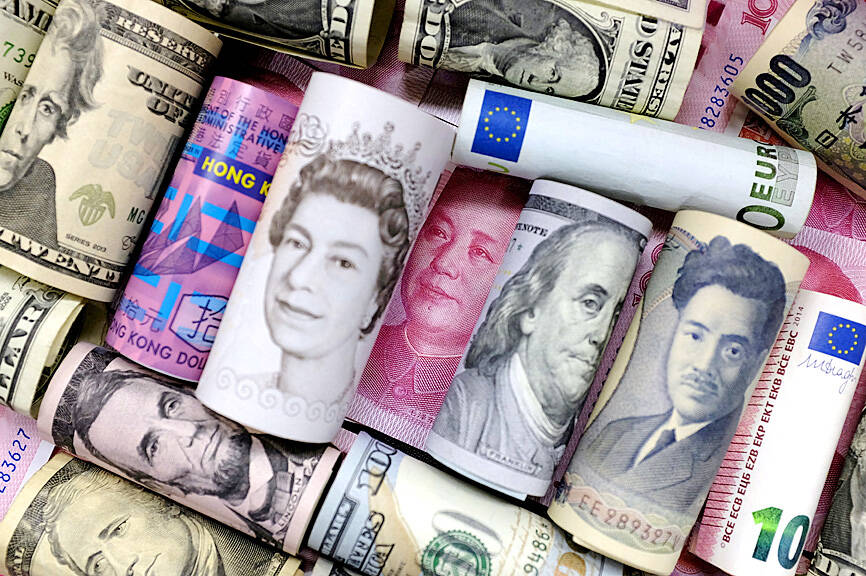Taiwan’s foreign exchange reserves at the end of last month continued to reach new highs on the back of an increase in returns from the central bank’s management of its investment portfolio, the monetary authority said on Friday.
The exchange movements of non-US dollar currencies against the greenback was another factor behind the foreign exchange reserve changes last month, the central bank said.
In addition, the value of foreign investors’ holdings of Taiwan-listed stocks and bonds, and New Taiwan dollar-denominated deposits also hit a new record high in a boom of the equity market, it added.

Photo: Reuters
The central bank’s data showed that foreign exchange reserves rose US$496 million from a month earlier to US$573.3 billion. It was the second consecutive month that the foreign exchange reserves increased, the data indicated.
Last month, the US dollar index, which tracks the currencies of Washington’s six major trading partners against the greenback, rose 1.14 percent, the central bank said.
The NT dollar lost 0.21 percent against the US dollar last month, while the yuan fell 0.61 percent.
The yen plunged 2.6 percent, the euro shed 1.16 percent, the pound fell 0.71 percent, the Canadian dollar lost 0.34 percent and the Australian dollar dropped 0.14 percent last month, the bank said.
Compared with other currencies, the NT dollar appeared resilient after volatility in April and May, so the central bank made limited efforts to intervene, Department of Foreign Exchange Director-General Tsai Chiung-min (蔡炯民) said.
At the end of last month, the holdings of Taiwan’s equities, bonds and NT dollar-denominated deposits by foreign investors rose to a new high of US$837.1 billion, which represented 146 percent of the country’s total foreign exchange reserves.
The ratio was also at the highest level, the central bank said.
Tsai said the record high in holdings by foreign investors reflected a highflying stock market last month as the TAIEX rose more than eight percent to top the 23,000 point mark in the month amid a frenzy about artificial intelligence.
The central bank’s data showed that Taiwan ranked as the world’s fifth-largest foreign exchange reserve holder, following China, Japan, Switzerland and India.
China remained the world’s largest holder of foreign exchange reserves, which fell US$9.68 billion to US$3.222 trillion at the end of last month as the yuan faced continued downward pressure amid a strengthening US dollar, the Chinese State Administration of Foreign Exchange said yesterday.

GROWING CONCERN: Some senior Trump administration officials opposed the UAE expansion over fears that another TSMC project could jeopardize its US investment Taiwan Semiconductor Manufacturing Co (TSMC, 台積電) is evaluating building an advanced production facility in the United Arab Emirates (UAE) and has discussed the possibility with officials in US President Donald Trump’s administration, people familiar with the matter said, in a potentially major bet on the Middle East that would only come to fruition with Washington’s approval. The company has had multiple meetings in the past few months with US Special Envoy to the Middle East Steve Witkoff and officials from MGX, an influential investment vehicle overseen by the UAE president’s brother, the people said. The conversations are a continuation of talks that

With an approval rating of just two percent, Peruvian President Dina Boluarte might be the world’s most unpopular leader, according to pollsters. Protests greeted her rise to power 29 months ago, and have marked her entire term — joined by assorted scandals, investigations, controversies and a surge in gang violence. The 63-year-old is the target of a dozen probes, including for her alleged failure to declare gifts of luxury jewels and watches, a scandal inevitably dubbed “Rolexgate.” She is also under the microscope for a two-week undeclared absence for nose surgery — which she insists was medical, not cosmetic — and is

Nintendo Co hopes to match the runaway success of the Switch when its leveled-up new console hits shelves on Thursday, with strong early sales expected despite the gadget’s high price. Featuring a bigger screen and more processing power, the Switch 2 is an upgrade to its predecessor, which has sold 152 million units since launching in 2017 — making it the third-best-selling video game console of all time. However, despite buzz among fans and robust demand for pre-orders, headwinds for Nintendo include uncertainty over US trade tariffs and whether enough people are willing to shell out. The Switch 2 “is priced relatively high”

Alchip Technologies Ltd (世芯), an application-specific integrated circuit (ASIC) designer specializing in artificial-intelligence (AI) chips, yesterday said that small-volume production of 3-nanometer (nm) chips for a key customer is on track to start by the end of this year, dismissing speculation about delays in producing advanced chips. As Alchip is transitioning from 7-nanometer and 5-nanometer process technology to 3 nanometers, investors and shareholders have been closely monitoring whether the company is navigating through such transition smoothly. “We are proceeding well in [building] this generation [of chips]. It appears to me that no revision will be required. We have achieved success in designing